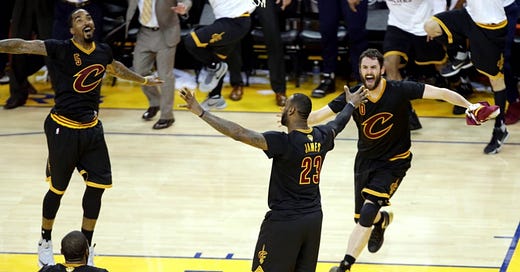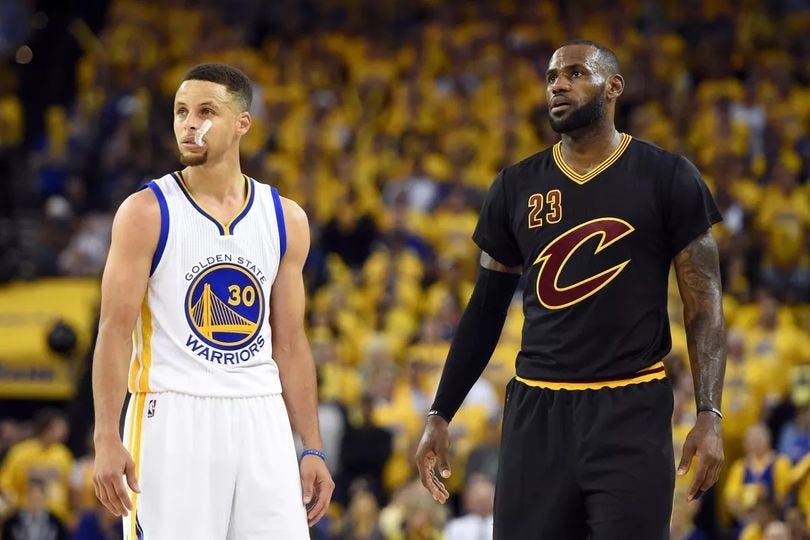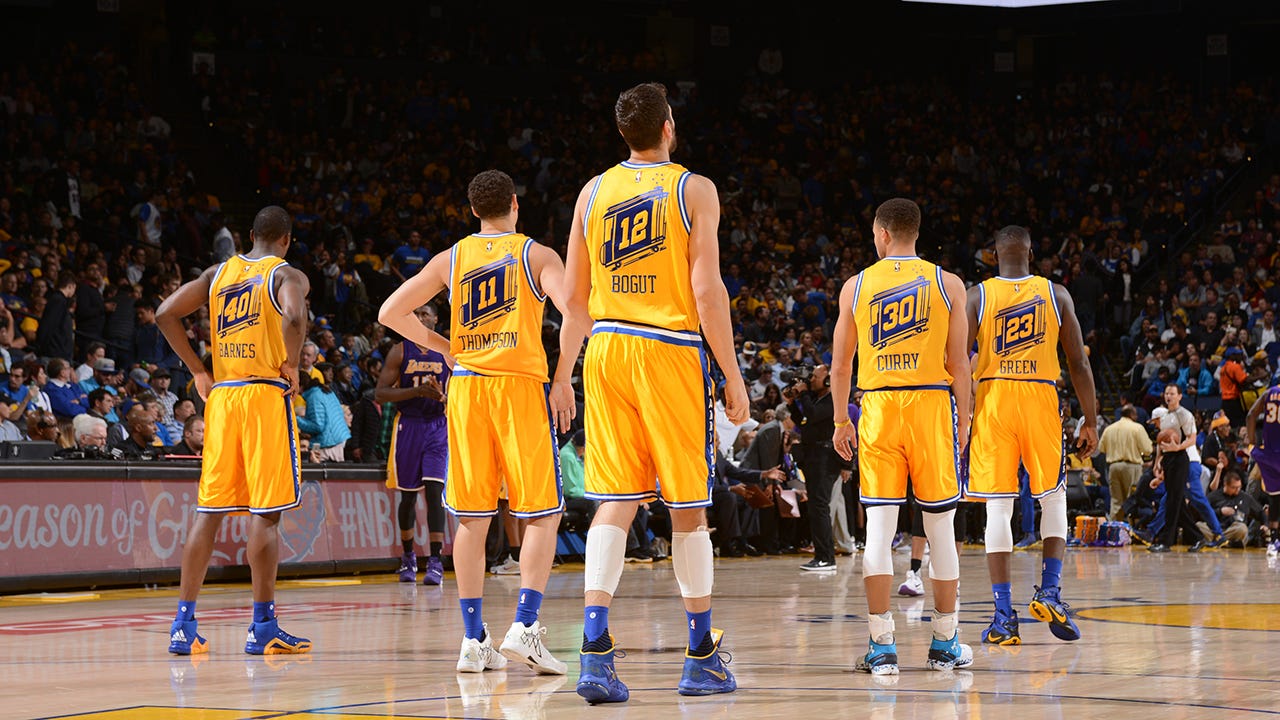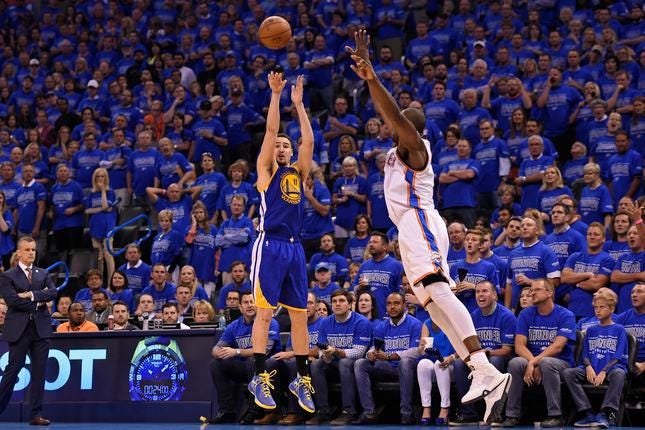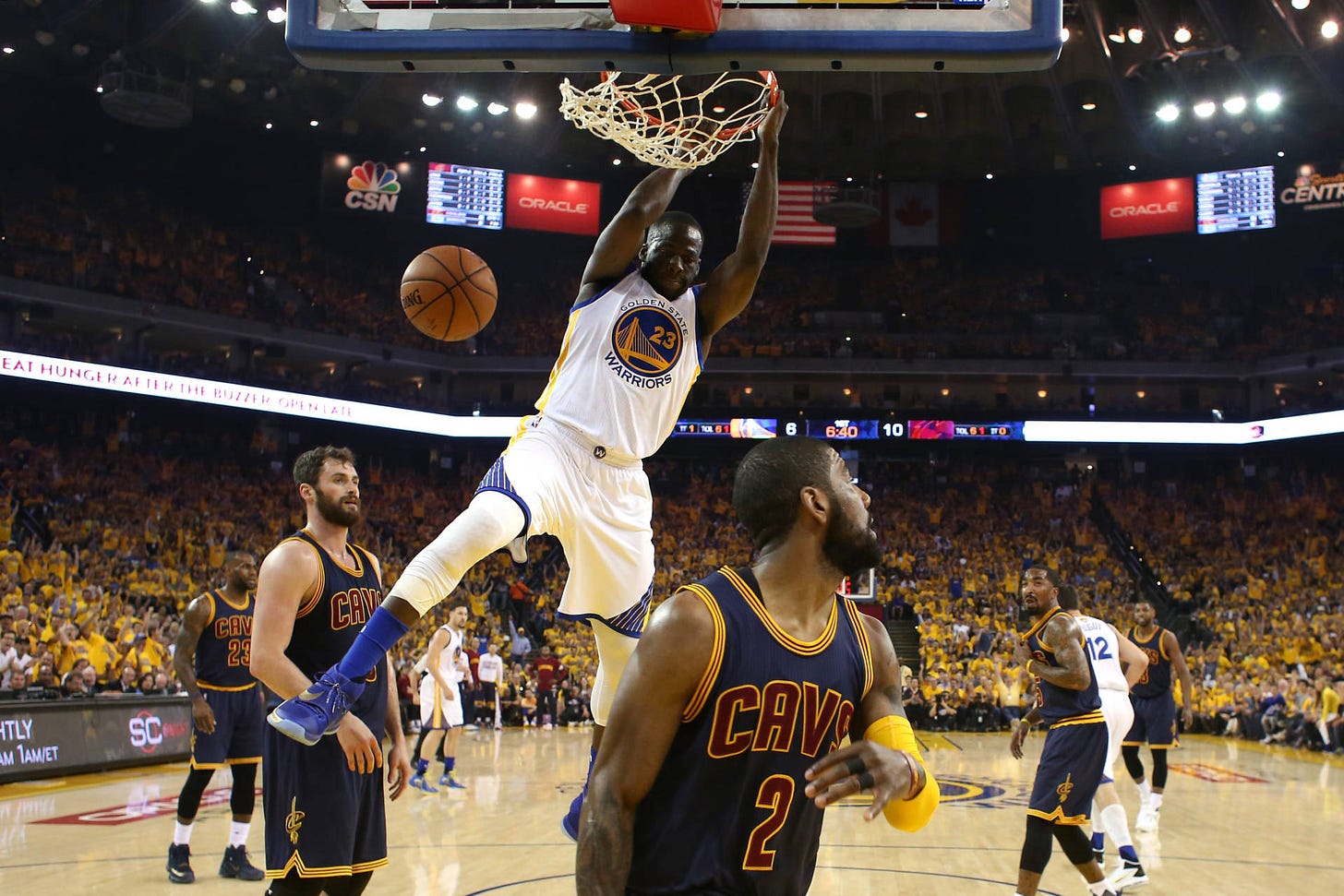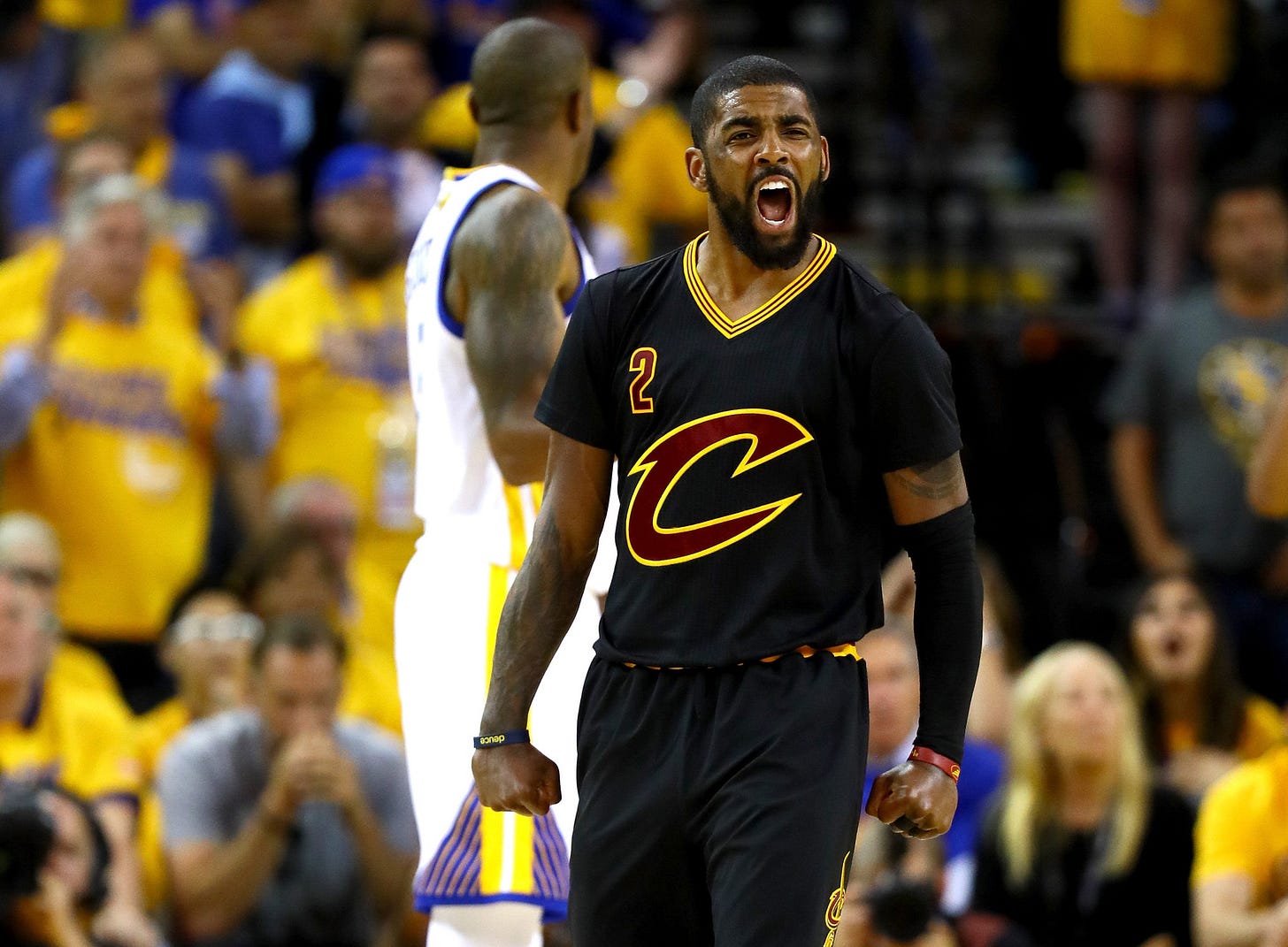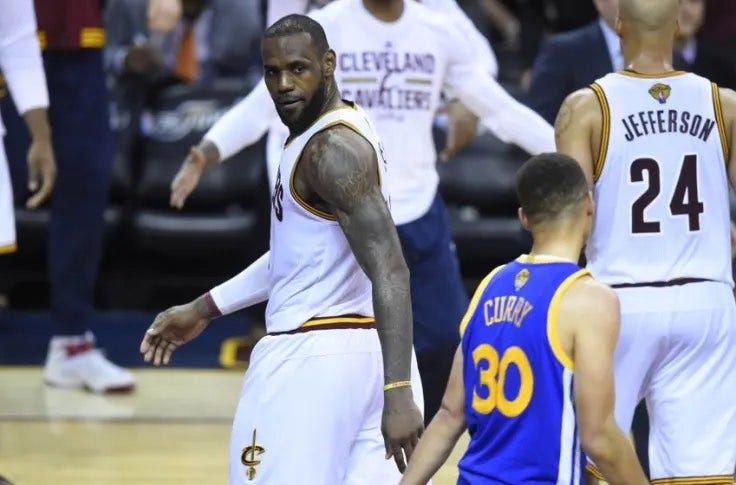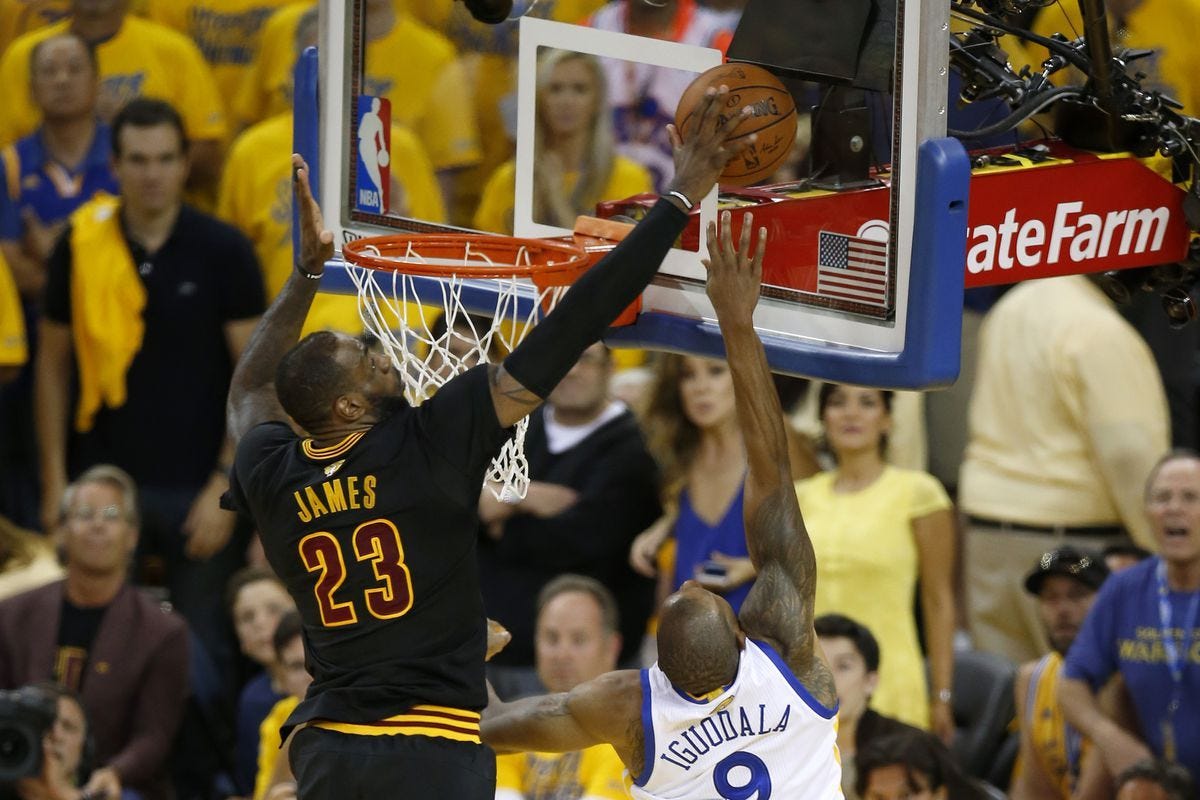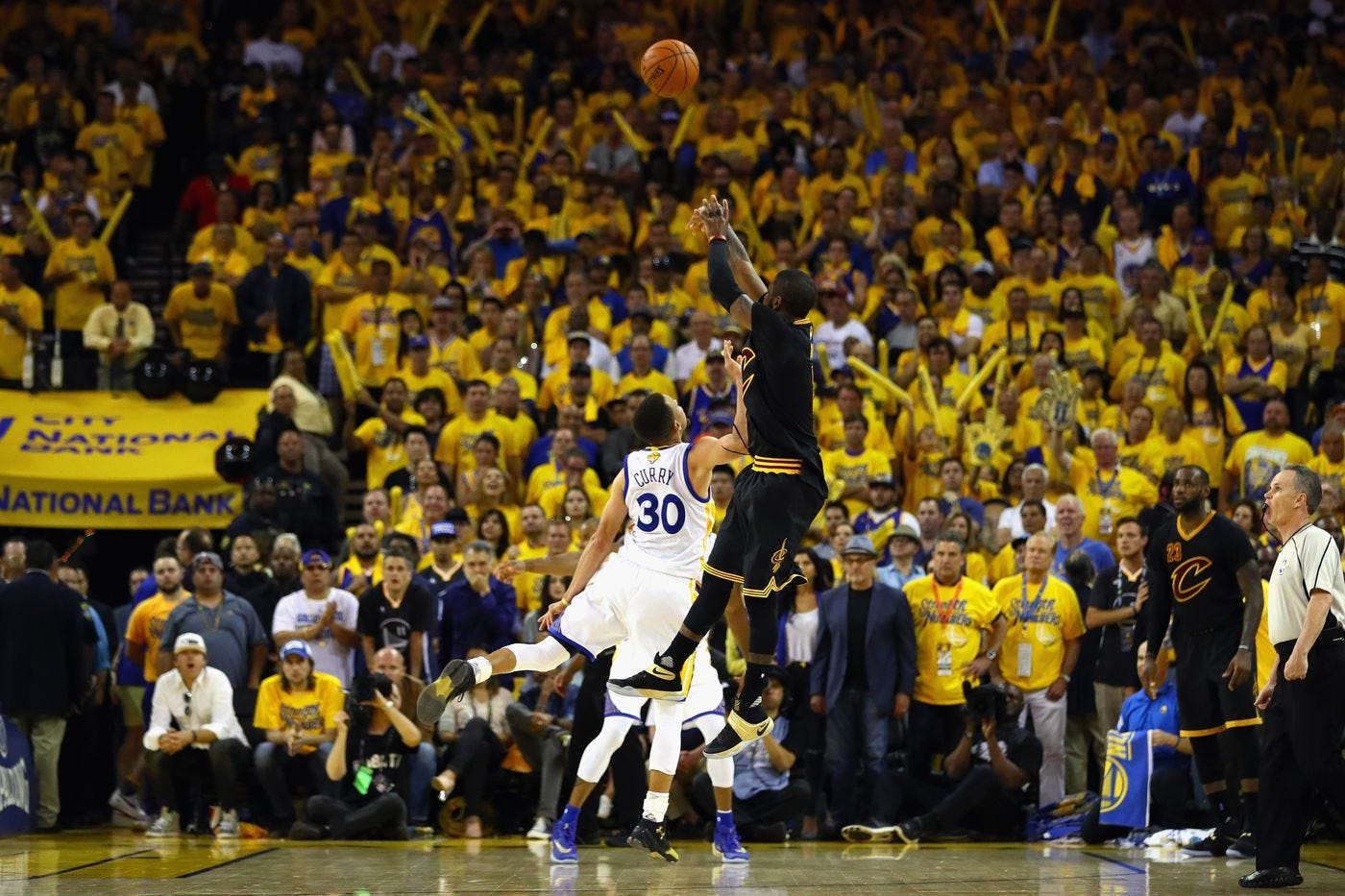2010s NBA Finals, Ranked: 4
Looking back at the 10 NBA Finals played during the 2010s, I bring you the fourth of a seven-part series where I rank them
I’ll be honest: I looooove the 2010s decade of NBA basketball. I might be somewhat biased towards it, simply because it’s the period of time in which I got into watching, enjoying and talking about basketball, but it’s still great nevertheless. The amount of all-time greatness we witnessed in it is startling and would take a while to put into words, but those that have been around know how great basketball was during that span.
In terms of talent alone, the decade might go down as the second-best (behind the 2000s), and the historic moments that happened on the basketball court are ones that will live forever. More specifically, the moments we witnessed during some championship series were remarkably great, and deserve their spot in a museum to celebrate basketball's greatest moments. However, since I'm not a museum director, I'll do the best I can to commemorate my favorite decade of NBA basketball and its moments: rank those series.
In appreciation of the 2010s and all those memorable moments it gave us, let's reminisce on the very best matchups (in most cases) each season had to offer: the NBA Finals of the decade. As the series that crowns a champion and acts as a ladder that a player can use to establish himself as one of the best in history, we saw some great series and individual performances during the 10 Finals of the 2010s. With that in mind, let's rank 'em! (because what else are we doing?).
Before I resume my rankings, let’s look over the criteria I used:
Historical Precedent: record(s) broken in series, impact series had on a player’s legacy, and everything else like that.
Competitiveness: number of games in series and margin of said games.
Rewatchability: being able to rewatch the series and enjoy it impartially.
Injuries: key injuries that impacted the result of the series.
This is part four of a seven-part series. You can find part one here, part two here, and part three here
Without any further adieu, let’s continue the ranking with the fourth-best NBA Finals series of the 2010s:
4. 2016: Cleveland Cavaliers vs Golden State Warriors (Cavaliers won 4-3); MVP: LeBron James (29.7pts, 11.3reb, 8.9ast, 2.6stl, 2.3blk on 49.4/37.1/72.1 shooting)
After their win in the 2015 Finals, many people questioned how valid Golden State’s championship was, considering it came against a Cavs team that didn’t have their second or third best players available for the majority of the series. Using this as motivation, the Warriors looked at the regular season as an opportunity to play at an all-time great level, and prove all the doubters wrong. They went on to do both: they showed they were as good as advertised (if not better), and had the best regular season of all-time:
-They started 24-0, the best regular-season start in American professional sports history (NBA, NFL, MLB and NHL combined)
-Spanning from the end of the previous season, they had a 28-game winning streak, the second-longest winning streak in NBA history
-They won 54 straight home games, an NBA record (the game they lost is one of the best played in the decade, don’t @ me)
-They won 34 games on the road, an NBA record
-Became the first team in NBA history to not lose two games in a row during a regular season, and to not lose twice to the same team
-Finished the season with a 73-9 record, the best regular season record in NBA history
-Steve Kerr, their coach, won Coach of the Year
-They had three All-Stars (Stephen Curry, Klay Thompson and Draymond Green)
-Stephen Curry won his second consecutive MVP award, this time doing so unanimously, the first player in NBA history to receive all first-place votes for the award. Curry led the league in scoring (30.1pts per game), steals (2.1) and free throw percentage (90.8 percent). He also became the seventh player in NBA history to shoot at least 50 percent from the field, 40 percent from three and 90 percent from the foul line in a season (the 50/40/90 club), becoming the first to do so while shooting 45 percent from three.
In short: the Warriors were VERY good, and spent their entire campaign competing for that elusive seventy-third win. It was well-documented throughout the season that Golden State was chasing that record that would cement their greatness. The Cavs, on the other hand, were already viewed by some as the team that should’ve won the championship the previous seasons, so all they had to do was get through the season healthy. They did so (outside of Kyrie debuting in December and missing other games), winning 57 games to clinch the best record in the East with relative ease and no controversies this time (sans firing David Blatt midseason and replacing him with Tyronn Lue).
This is the best NBA season of the decade, my favorite of all time, and it took place in one of the best (imo the best) years in sports history (maybe I write about that in the future *wink wink*). One of the main reasons for that was because of the amount of competition around the league (especially in the postseason) and the number of contending teams: outside of Cleveland and Golden State, Toronto, Miami, Oklahoma City, San Antonio, Boston and Los Angeles (Clippers) fielded teams capable of winning a championship. The Cavs (swept the Pistons and Hawks) nor Warriors (gentleman swept the Rockets and Blazers) had problems getting through the first two rounds, but found their match in the Conference Finals.
Cleveland faced a Raptors squad fueled by their then franchise-best 56 wins that had come off two seven-game series (Indiana in the first round and Miami in the semifinals), while Golden State faced the deepest Thunder squad ever assembled during the Kevin Durant/Russell Westbrook era, which had defeated the 67-win Spurs (second-best record in the league, team that chased Golden State in the win column for most of the season) in the second round.
In the Eastern Conference, the home team won the first five games, with the Raptors looking like a pushover on the road and a team worthy of being in the Finals at home. But, ultimately, the Cavs clinched the series on the road in “Jurassic Park” with spectacular performances by LeBron James (33pts/11reb/6ast/3blk/1stl), Kyrie Irving (30pts/9ast/3stl) and Kevin Love (20pts/12reb). On the other side, the Warriors had a tougher path: they split the first two games at home, and then they lost two straight at OKC by getting blown out in both Games Three and Four. They faced a 1-3 deficit, and it wasn’t a fluke: the Thunder looked dominant and seemed like the one team that could end the Warriors’ fantastic season.
However, Golden State, once again, prevailed through adversity: they won Game Five at home (despite KD’s 40pts) and rallied late in Game Six on the road (entered the fourth period down by eight, and were trailing by seven with 5:48 left to play before going on a 21-7 run to close the game) behind the masterful outing of Klay Thompson (41pts, 19 in the fourth quarter, and a playoff record 11 three-pointers made), which began the “Game Six Klay” legend, to force a Game Seven.
And even though anything can happen in the seventh game of a playoff series, the reality was that the Thunder blew their shot at closing it out, and had no chance of winning a game in Oracle after Golden State had all the momentum. It especially didn’t help that the unanimous MVP went off for 36pts and 8ast on 13-24 shooting from the floor and 7-12 from beyond the arc.
When the dust settled, the Warriors had made an epic comeback to put them in position to win back-to-back titles and cap off the greatest season of all-time, while the Cavaliers had won in one of the hardest environments to win at (Toronto) and looked to prove they were the better of the two when healthy. LeBron. Curry. Kyrie. Klay. Love. Draymond. We were set for a treat. Or so we thought.
Even though Curry and Klay Thompson struggled in Game One (combined for 20pts on 8-27 shooting from the field and 4-13 from three), the Warriors took a 1-0 lead with a 104-89 win; the Warriors bench provided a big spark, scoring 45pts, led by Shaun Livingston’s 20 (10 in the fourth quarter). Game Two was an even worse blowout that began in the second quarter with a 20-2 Golden State run and ended with a 110-777 score. Draymond Green led the attack with 28pts/7reb/5ast, the Splash Brothers played better, and the Warriors set the record for highest margin of victory in the first two games of a Finals series (48).
The Cavs showed signs of life back at home in Game Three, winning for the first time in the series in wire-to-wire fashion. A 9-0 to start the game got them off and running, and they outscored the Dubs 69-47 in the second half to secure a 120-90 victory. Richard Jefferson got the start for the injured Kevin Love (concussion suffered in Game Two) and provided good minutes, while LeBron (32pts/11reb/6ast) and Kyrie (30pts/8ast) led the charge offensively. The Cavs had a perfect shot at tying the series, beginning the third quarter of Game Four up by eight, but the second half went 58-42 in the Dubs favor and they prevailed on the road.
Steph, who was only averaging 16pts on 40 percent shooting through the first three games of the series, went off for 38pts (24 in the second half), 6ast and 5reb with seven threes, and Klay Thompson had 25pts on 7-14 shooting. Golden State made 17 threes (a then-NBA Finals record for most in a game), more threes than twos (16 two-pointers; first time in Finals history that happened), which led them to win their 88th win of the season (record for most wins in a single season, counting the playoffs).
Besides those records, the game was notable for two other reasons: firstly, it gave Golden State a 3-1 lead in the series, a deficit that no team in NBA history had ever come back from in Finals history up to that point. And second, because of the altercation between Draymond Green and LeBron James in the final minutes of the game; Green and James collided on a screen, which sent Green to the floor, LeBron stepped over him and Green retaliated by hitting him in the part no man wants to be hit in. They both *aggressively* fought for a rebound afterwards that got them called for a double foul and to be separated after exchanging words. After the game, Draymond got a flagrant one called for his swing at James, resulting in his fourth technical foul of the playoffs, which triggered an automatic suspension for Game Five.
With Green out and the Cavs facing a deficit no one had ever conquered against the best team in NBA regular season history, the seeds for one the greatest comebacks in sports history were planted. And the team representing a city that had lived in sports mediocrity for more than 50 years was ready to take advantage of the opportunity.
Andrew Bogut got hurt in the third quarter of Game Five, keeping him out for the rest of the series and keeping the Warriors without their best rim protector. Nevertheless, nothing should be detracted from what happened in that game: Kyrie Irving and LeBron James dominated, having 41pts/6ast/2stl/1blk and 41pts/16reb/7ast/3stl/3blk respectively, becoming the first pair of teammates to each score 40+ points in a Finals game and giving the Cavs life.
Back at home for Game Six, there was a buzz in the air about the Cavs forcing a Game Seven; they had momentum on their side, they were looking to make history on multiple fronts (win Cleveland a championship for the first time in 52 years and come back down 1-3), were facing the best regular season team of all-time and their two best players were coming off historic performances. And while hindsight is certainly 20/20, what transpired in Game Six was expected: the Cavs never trailed, started the game on an 8-0 run and led 31-11 after the first period.
Yes, Golden State closed the gap to eight in the second quarter and kept it relatively close throughout, but there was never a sense that they were closing it out there. Although Curry (30pts) and Klay (25pts) tried, Cleveland’s firepower was too much: Kyrie Irving (23pts *20 in the first half*/4reb/3ast/2stl/2blk) fueled them in the first half, Tristan Thompson (15pts/16reb) was a monster all night, and LeBron (41pts *27 in the second half, 17 in the fourth quarter*/8reb/11ast/4stl/3blk) was dominant for the second game in a row.
You could feel the momentum shifting by the result of the game, and the players’ extracurricular actions made it more obvious; James talking smack to Curry after blocking one of his layup attempts, and Steph picking up his sixth foul and his subsequent reaction all told the same story: the Cavs were back in this series, Golden State was blowing their shot at a flawless season, and it was anyone’s championship to win.
The stage was set for a legendary Game Seven. Besides being a “win a championship or come one game short” scenario for both teams, a seventh game is one that can make or break careers, shape entire seasons, and define legacies. It was time to prove by “Game Seven” are the two best words in sports, and both teams were looking for history: Cleveland was looking to complete a historic Finals rally, while Golden State looked to cement their 2015-16 season as the greatest in NBA history. It’s safe to say that pressure was at an all-time high, and that the next 48 minutes would be filled with amazingness. Even with those lofty expectations set, what happened on June 19, 2016 in Oracle Arena surpassed all possible predictions…
Both teams started playing with confidence: the Splash Brothers made a couple of shots, Kyrie made tough shots, LeBron had a thunderous dunk after Steph missed a steal attempt on a J.R. Smith pass, and Draymond led all scorers with 7pts after one. Green commanded the second quarter with 15pts, leading Golden State to win the period 27-19 and a 49-42 lead at the half, a lead that feels way bigger in a playoff game (amplified in a Game Seven).
To answer, Cleveland started the third with a 12-5 run to tie the game at 54 with Smith scoring 8 of those 12. After this, Curry scored five in a row and the Cavs bounced back with an 11-0 run, culminating on a Kyrie and-one transition layup. Even with that, the Warriors took a 76-75 lead heading into the final period of play.
Both teams continued exchanging leads during the beginning of the quarter. LeBron scored a three with less than five minutes left to give the Cavs a 89-87 lead, which was followed by a Klay layup to tie it at 89 with 4:39 remaining. In the fourth quarter of a close seventh game, any basket is important, and any lead, no matter how small, can seem really big. That is precisely what makes the ending to this game so amazing.
James misses a jumper. Curry misses a three. James misses another jumper. Klay misses a jumper. James misses a layup. Iguodala misses a transition three and Curry fouls James on the rebound. Timeout Cleveland. With every passing second, the game got slower and every possession became more crucial than the last. Everything was still to play for in the final 2:50 of action in a game where it seemed the next basket would decide the outcome. Love misses a hook shot, Green misses a triple and the ball goes out of bounds with 2:11 left. Irving misses a floater and the Warriors come away with it, creating a 2-on-1 fastbreak with Iguodala and Curry against a back-paddling Smith. I’ll let Mike Breen’s commentary describe that play.
The game is still tied. On the next possession, James missed a hook shot, and Curry missed a three on the other end. Timeout Cleveland with 1:09 left. If someone wanted to make a legacy-defining play, the time was now.
Kyrie received the inbound [pass defended by Klay. Smith comes over to screen and get Curry to switch on to Irving, something they had been attacking all series. Irving crosses over three times, hesitates and elevates for an angle three… and he drills it. Cavs up 92-89.
Kerr doesn’t call for a timeout, and Curry opts to attack Kevin Love on a switch. Love plays the best defense he’s played in his entire life, forcing Curry to pass up the ball and miss the game-tying three when he got it back. Irving goes out in transition, gets blocked, gets it back and passes it out, which leads to LeBron being fouled by Harrison Barnes with 18.7 left.
Irving receives the inbound and drives the length of the court defended by Klay, gives it to LeBron who cut through the foul line and misses what would’ve been one of the greatest dunks in basketball history after being fouled by Green. James misses the first free throw and makes the next. 93-89, timeout Golden State, 10.6 left to play. On the way to the bench, LeBron had one finger up and was telling his team: “one stop” repeatedly. One stop was all that Cleveland needed to be immortalized in history.
The inbound goes to Klay, he dribbles until passing it to Green in the post defended by Tristan Thompson, who fouls him. That was their last foul to give before Golden State entered the bonus. 6.5 seconds left. The inbound goes to Curry, he fakes, dribbles, steps back, three doesn’t go, Speights takes the rebound away from LeBron… but it doesn’t matter. With time running out, Speights’ three doesn’t fall, and the Cavs are celebrating while it happens because they did it.
After 20 lead changes and 11 ties, the Cavs won one of the greatest basketball games ever, 93-89, and became the first team in history to come back down 1-3 to win a Finals series. Draymond Green had the best game of his entire career with 32pts (22 in the first half)/15reb/9ast/2stl on 11-15 from the field and 6-8 from three, but it was to no avail; Kyrie had 26pts (12 in the third) and 6reb, and LeBron completed the best three-game stretch of his career with a 27pts/11reb/11ast triple-double.
The Cavs gave Cleveland their first championship in 52 years, beating the best team in regular season history twice in their home floor to do so. LeBron James won his third ring, fulfilling the promise of bringing one to his hometown team and with whom he’d spent the first seven years of his career and left without completing that mission. The Warriors blew a 3-1 lead, failing to end a perfect season and giving validation to those that believed that the Cavaliers would have beaten them if they were healthy.
After winning Game Five, the Warriors broke the record for most wins in a single season with 88 (counting regular season and playoffs). With his performances in Game Five and Six, LeBron became the first player to score 40+ in two straight Finals games since Shaquille O’Neal in 2000, and the fifth all-time to do so. After winning the championship, the Cavs became the first champion to win all of their series on the road since the 1999 San Antonio Spurs, and the first to win a Game Seven in the Finals on the road since the Washington Bullets (no Wizards) since 1978.
Also, they won their first championship in franchise history. LeBron won Finals MVP unanimously, becoming the fifth player in history to win said award at least three times, the third to have a triple-double in a Finals Game Seven, and the first to lead both teams in a Finals series in the five main statistical categories (points, rebounds, assists, steals and blocks). And in a year filled with legendary games, Game Seven of this series took the ESPY for Best Game of the Year in all of sports.
The series affected the legacy of all it’s protagonists: the GOAT argument of LeBron James reached its peak after winning this championship and after being author of one of the greatest defensive plays in history, Kyrie Irving solidified himself as one of the clutchest players in NBA history and his shot was cemented in basketball history, Draymond could’ve been the MVP of the series after his Game Seven outing, and Stephen Curry was heavily scrutinized for not being able to lead his squad to close the deal, sentiment that was increased when the Dubs acquired Kevin Durant a month later.
This series gave us one of the best games in history, a historic performance by a pair of teammates, the best three-game stretch for any player in history, and one of the best comebacks in sports history… so why isn’t it at least top three? There are two factors that keep it out of that range:
1. Key players out: even though few recognize it as such, Andrew Bogut’s injury was very significant. Of course, nothing should be taken away from anything the Cavs or James did in those final three games, but it’s no coincidence that LeBron had three legendary games after Golden State lost their best rim protector. That, along with Green’s suspension (which, I must reiterate, was because of an accumulation of technical fouls, not an outright suspension for hitting LeBron) impacted the last three games, all Cleveland wins. Sure, these losses weren’t as big as Cleveland’s in 2015, but they were still important nevertheless.
2. Competitiveness: besides the last game and most of Game Four, this series wasn’t close at all; Game Seven was the only game decided by less than double digits. In spite of the series being memorable for its history, the series as a whole isn’t memorable for being a close one. The performances are memorable, the games are not.
The history made in this series, the performances it had, the effect it had on multiple legacies, and the legendary Game Seven are some reasons for why this series deserves to be in the top five of the 2010’s Finals. However, because of players out and the series not being competitive for the most part, it can’t be in the top three. If you look back at the 2016 Finals, it has an amazing narrative (Cleveland winning, the shots/performances, Golden State choking, etc) that is fantastic in its own right and is one of the best ever seen. But, something it doesn’t have is rewatchability outside of Game Seven; in terms of the games themselves, the important part of every series, it severely lacks.
That speaks to the amount of greatness, competitiveness and history in the three remaining series on my ranking. And as big as this series was for LeBron, his biggest triumph doesn’t surpass his biggest failure…
More on that in part five of this ranking, which can be found here

